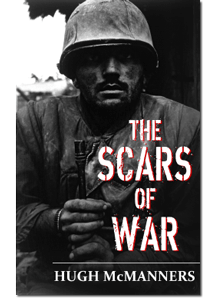 Do you want to know what war is really like?
Do you want to know what war is really like?
This book explores the brutal realities of warfare that are often glossed over in official history books, autobiographies and regimental diaries, with remarkable and revealing candour.
Buy on amazon.co.uk | Buy on amazon.com
‘A noble and courageous approach to an aspect of war concealed too often and too easily… Hugh McManners has made a valuable and important breach into the citadel of a subject which has been guarded in silence for too long’
– Robert Fox, Daily Telegraph
‘A stirring and disturbing book’
– The Times
‘The most compelling, moving and disturbing book that I’ve read in a very long time. Read it; I think you’ll never forget it.’
– Len Deighton
From readers’ reviews of the book:
‘This is without a shadow of a doubt a great book, I have never read non-fiction that is better than this work. Totally serious, without an iota of cheap sensationalism, intelligent and absolutely fascinating. It is also probably the most horrific book I can remember in that it describes war as it is in reality, and by extension also the effects of physical and psychological violence on human beings.’
‘A splendid book. Haven’t finished it yet, but it won’t be long. I go to bed each night aiming to only read for a short while, and the next time I look at the clock an hour has passed!’
About the book
War is by far the most traumatic ‘life event’ any human being can experience – a devastating combination of danger, uncertainty and horror. What really happens on the modern battlefield? How do today’s professional soldiers prepare for, and cope with, the physical and psychological hardships of combat? How do individuals behave under extreme conditions? And what happens when the combatants return to normal life?
Hugh compares the ways in which the British Army, the US Army and the Israeli Defence Force motivate their peacetime soldiery and train their special forces to ‘do business’; he shows how the power and range of today’s weapons – and the ability of technology to eliminate darkness so that fighting can take place around the clock – makes modern war more stressful than ever before; and he looks at the long-term psychological and emotional effects of combat, including the guilt of survivors. Case histories of Post Traumatic Stress Disorder from the Vietnam, Falklands and Gulf Wars are sympathetically explored, as are army, navy and air force attitudes to the problem.
The Scars of War carries on where John Keegan’s classic The Face of Battle left off. It is a powerful and wide-ranging report from the front, which had a profound effect on many aspects of military thinking.
Since its first publication in 1992, The Scars of War has been included on the required reading lists for many Military and War Studies courses – including The Army Staff College Camberley.
Note on the e-book edition
The e-book was re-published in 2014 and is an updated edition of a book first published in 1992. Since then, British troops have seen peace-keeping and peace enforcement operations in the former Yugoslavian Republic, a brief war during the invasion of Iraq, and then multi-tour counter-terrorist campaigns in Iraq and Afghanistan. Afghanistan has been the British and US Army’s sole focus for over a decade.
As we’ve seen from these more recent campaigns, the relevance of this books message is even more relevant today. Hugh McManners founded a neuroscience research group at the University of Oxford (The Scars of War Foundation) to address these issues, and find ways of diagnosing and treating soldiers who become clinically affected – as so many do.
As the British Army changes from its previous Afghanistan counter-terrorist focus, the hard, brutal lessons learned in the Falklands – which was the last General War fought by British troops – are now even more important. This, plus the increasing role played by actual brain injury in each individual after-math of war – thanks to the ever-increasing efficiency and power of modern munitions.